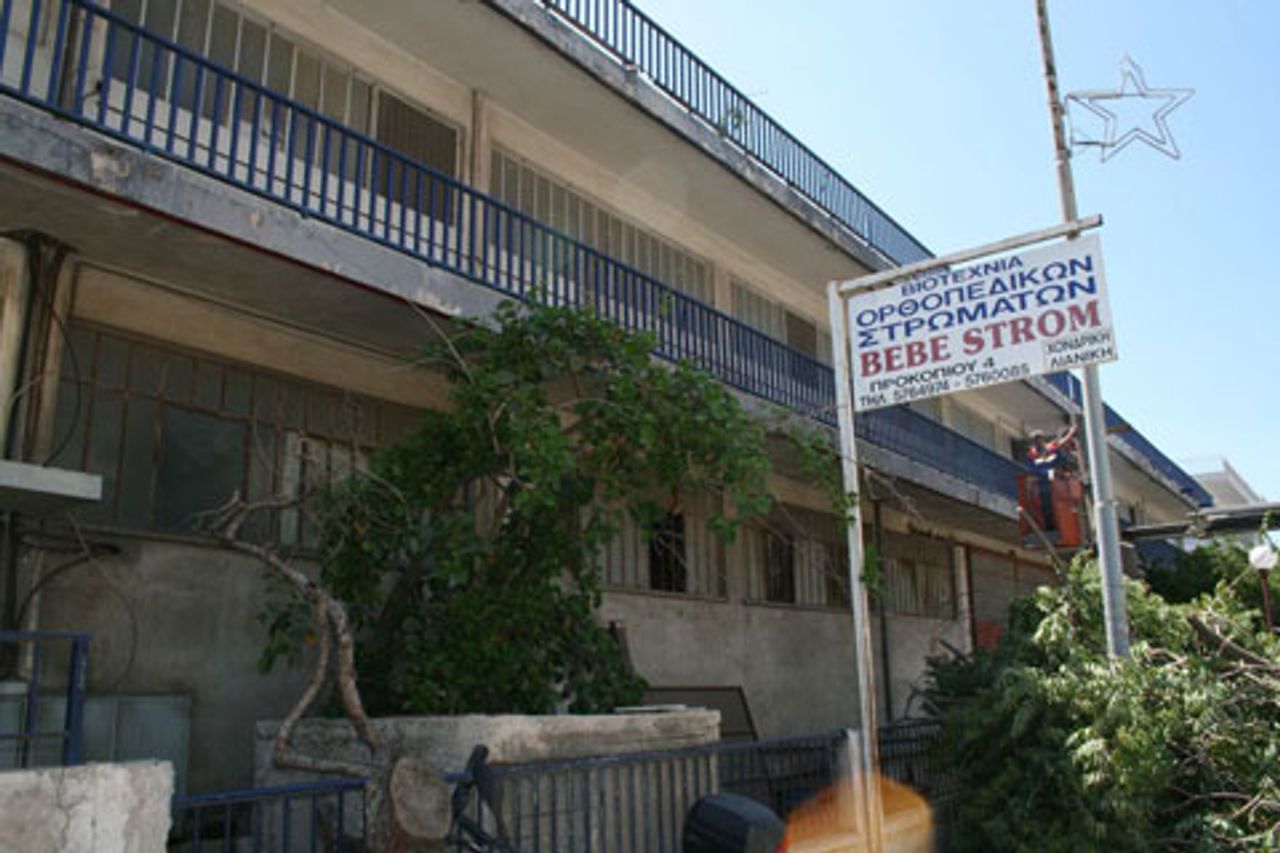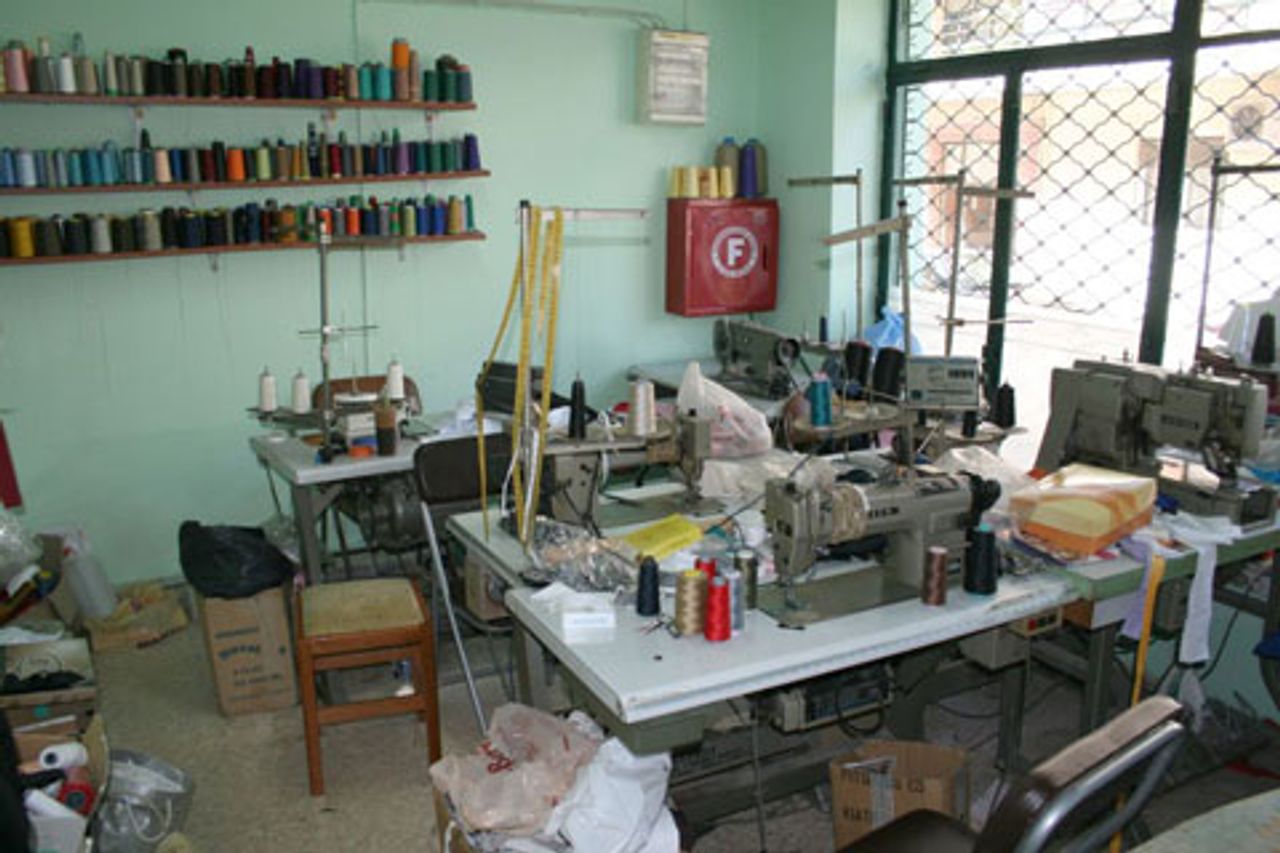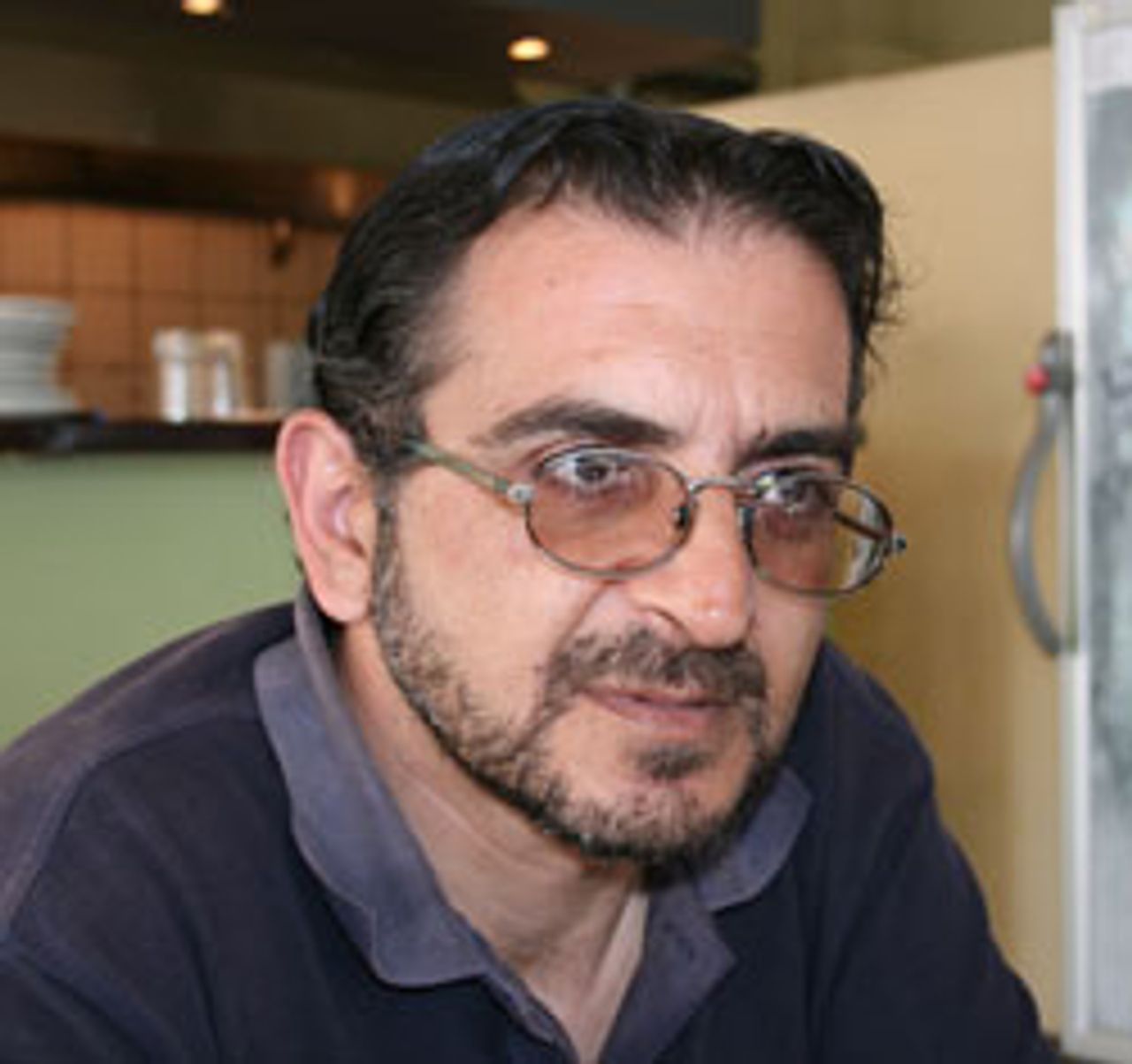WSWS reporters visited Peristeri, a northwest suburb of Athens that is home to many workshops.
These are small businesses specialising in a variety of trades, including textiles, furniture, auto repair, and artistic design. In a 2007 article, Balkan City Net wrote: “Peristeri is characterised by small businesses employing 2 or 3 people. Of its total population, 39 percent is working, with 6.7 percent being employers and 81.4 percent being employees or free-lancers.”
 A closed down workshop in Peristeri
A closed down workshop in PeristeriPeristeri’s workshops have been hit hard by rising competition, and they face difficulties in obtaining bank loans. Greece’s debt crisis is worsening these problems.
The WSWS spoke to Sotiria, who has a textile shop specialising in making and repairing company uniforms. She said: “My business has fallen 50 percent since the crisis. First of all, many souvlaki or kebab shops have closed due to the crisis. Also, there is competition from Chinese shops. Due to the recession, people buy fewer clothes, and also they use their sewing machines to repair their clothes and to work as individual seamstresses. Last year, work was going well and I was preparing to hire three people. But that changed.”
She explained, “Most of the shops in the area have closed down for lack of work. Many shops go to countries north of Greece for cheaper labour.” She said many operations were moving to Bulgaria, in particular.
 Sotiria’s workshop
Sotiria’s workshopShe said that her industry was being transformed by big businesses’ relentless search for profit: “Big companies come here, have us cut the fabric, and say we’ll make the clothes in Bulgaria because it’s cheaper. Now people [in the textile industry] often work for cleaning companies. Those cleaning companies get contracts with the public sector for €300,000, but they only pay €100,000 as wages; they have huge margins.”
She underlined the lack of financial support from the banks and the government: “We don’t have support as small businesses, we need more support from the OAF [Job Agency]. It’s very hard to get loans from the banks. I make a 20 percent margin, but the bank wants 14 percent of that. So we need more support. If I received a subsidy, it would be better for the economy; I could do more work and there would be more tax revenue, because I don’t evade my taxes.”
Asked if the billions of euros loaned to Greece in the context of the European-IMF bailout had made it easier for her to obtain loans, Sotiria replied: “No, on the contrary, it’s become harder.”
Asked to comment on claims in the international media that Greece is in debt because Greeks do not work hard enough, she said: “It’s a big mistake to say that Greeks have it easy. I work from 8 a.m. to 2 p.m., then from 6 p.m. to midnight, six days a week. I earn €13,000 a year, plus €20,000 from my husband, and it’s still not enough. He’s a second engineer in the merchant navy. He’s away roughly half the time.”
Sotiria also noted that wages in her industry were not high: “Workers would start at €600 a month. Altogether, hiring a worker would cost me €1,100 to €1,200 a month, once the charges are paid to the state.”
Asked to explain what the consequences of the crisis had been on her family, she said: “My brother is a widower with two children, and he has lost €6,000 [in income per year]. My other brother and his wife are retirees, and they have lost €9,000. My younger sister has lost €4,500. Her monthly mortgage payment is €600, from a salary of €1,150 a month.”
She noted that people’s finances were further stretched by the need to support aged parents: “Many very elderly people have pensions of only €300 to €350 a month—for instance, farmers get €330 a month. This is because they retired before the introduction of extra contribution schemes, so they have only the basic state pension.” She noted that even this tiny sum did not go very far, as the elderly have to pay €100 per month for medical coverage.
“My two children study in Patras,” Sotiria said. “Until last year, they had their own life, they could rent a place, cook at home, and had pocket money.” Since the austerity measures enacted last December, “they rely on their uncle and aunt.” She said her son might return to take over her shop, if it managed to stay open.
The WSWS spoke to Kostas, who is finishing his compulsory military service and is 20 years old, outside Peristeri’s employment office.
He said: “I’m in the army, I will get out in 10 days. I have an open-ended contract with Sklavenitis supermarket—I was working in the storeroom, now I will work in the delicatessen or in the meat section. If I work six hours, I get €620; if I work 8 hours, I get €900 or maybe €950 gross [per month], but then €250 of that will go in taxes.”
He explained that he also had to plan on how to finish his schooling: “I didn’t finish high school. This time last year, I was in school, but the army refused to give me a deferment so I could take my exams, so now I have to go back to school. Maybe I can go to a technical college after this. I’d like to work with freezers and thermal plumbing.”
Asked about the social cuts carried out by Greek Prime Minister George Papandreou, he said: “The politicians are idiots, they don’t know what they’re doing.”
Asked about his political opinions, he said he supported the Greek Communist Party (KKE): “Everyone in my family is in the KKE.”
WSWS reporters discussed with Kostas their political differences with the KKE, which, though it has a following in the working class due to its role in the Greek civil war and opposition to the 1967-1974 military junta, is a Stalinist party, committed to a nationalist outlook. They stressed that workers face an international class enemy, the major banks and bourgeois politicians who are trying to impose austerity policies on the working class—to which Kostas agreed.
Kostas was surprised to hear of the problems of poverty and unemployment facing workers in the US, commenting: “It’s true that the KKE does not really care about what happens outside of Greece.”
 Kristos
KristosThe WSWS also spoke to Kristos in a local café. He is a 47-year-old graphic designer who has been unemployed for three years.
Kristos explained: “From 1980 to 2005 were good times for my line of work. Then, starting in 2006, things got harder. Now, I’m told to work without insurance and to accept flexible working times, and I have to pay into a new insurance fund. I was working for €24,000 a year before, now I get €250 a month. I live on support from my family. I’ve cut out going to the theater or cinemas. I may try to go live in my mother’s village. There are many English people there; it’s a village in Crete, which lives off tourism.”
Asked about the situation in Peristeri, Kristos said that workshops “started to close about 10 years ago. Either they found immigrant labour paid at €20 per day with no rights, or they shut down.”
He added, “Official unemployment figures are artificial. The Union of Graphic Designers thinks the number of unemployed is over 1 million.” Since Greece’s work force is about 5 million people, this would translate into an unemployment rate of 20 percent, as opposed to the official unemployment rate of 12 percent.
Kristos explained that the Greek political establishment saw the crisis coming last year, without telling the people: “As the situation evolved, they knew what was going to happen. That’s why [former Prime Minister Kostas] Karamanlis quit [and called early elections, losing to Papandreou last October]. The situation reached its limits—now Greece is like Argentina [which defaulted on its debt in 2002], going bankrupt.”
